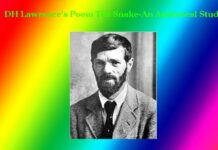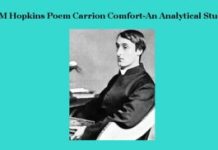Theme of Democracy in Whitman’s Poetry
Theme of Democracy in Whitman’s Poetry
Theme of Democracy in Whitman’s Poetry
‘Democracy’ is a system of government where people are governed by themselves, especially through the elected representatives of the people of a nation. This system of government is said to be a popular system of administration where the citizens enjoy more and more individual, social, economic, religious and political freedom. Walt Whitman was a great advocate of democracy. But his sense of democracy was something more violent, and wayward because he insisted on the natural freedom in a democratic country. In his poetry, he portrays a vivid picture of the American people and the ideals, aims and doings of a democracy. Throughout his poetry, there are pictures of all classes of people as—the blacksmith, the butcher, the farmer, the soldiers on the battlefield, the prostitute etc. But he, not only tells about them but also delineates the inner nature and democratic aspiration such as—virtues, follies, lusts, politics, politeness, lunatics, etc.
In a democracy, an individual gets much scope to enjoy freedom. He can do what he likes. In other words, to say, he is equally significant like every other people. Hence he says in ‘Song of Myself’ section 1:
”I celebrate myself and sing myself
And what I assume, you shall assume
For every atom belonging to me as good belongs to you.”
Again he says in the same section of the poem that he is ready to share good and bad equally with others and desires to enjoy natural freedom without any checks. He says:
”I harbor for good or bad, I permit to speak at every hazard,
Nature without check, with original energy.”
In a democratic country, every citizen can enjoy everything he wishes or desires because in a democracy everything gets proper development. Even realistic and positive science also gets proper usage. He glorifies science and says in section 23 of ‘Song of Myself’:
”I accept reality and dare not question it,
Materialism first and last imbuing.
Hurrah for positive science!
Long live exact demonstration!
………………………………
This is the lexicographer, this the chemist,
this made a grammar for the old cartouches,
These mariners put the ship through
dangerous unknown seas,
This the geologist, this works with the
scalpel and this is a mathematician.”
Whitman is the spokesman for democracy; he brings into account the hopes and wishes of all classes of people in American democracy. In section 24 of ‘Song of Myself’, he writes:
”I speak the pass word primeval;
I give the sign of democracy,
By God! I will accept nothing which all cannot have
their counterpart of on the same terms.
Through me, many long dumb voices
Voices of the interminable generation of prisoner and slaves,
Voices of the diseased and despairing and of
thieves and dwarfs.
Voices of cycles of preparation and accretion.”
In a democracy one shares the good and bad of others and vice-versa. The poet says in the poem ‘The Sleepers’:
”I dream in my dream all the dreams of the other dreamers,
And I become the other dreamers.”
Again he says in the same poem that in a democracy, a person enjoys so much freedom that he can be whatever he likes to be and along with it he can play the role of everybody, as—
”I am the actor, the actress, the voter, the politician,
The emigrant and the exile, the criminal
that stood in the box.”
In a democracy, there is no creed for high and low, all are equal in the eyes of law and everybody can go on his work holding hand in hand. He shows how different castes of people work together in America, in section-8 of ‘The Sleepers’, Whitman writes:
”The Asiatic and African are hand in hand,
The European and American are hand in hand
Learned and unlearned are hand in hand
and male and female are hand in hand.”
In the poem ‘Faces’ he portrays the picture of men and women in various professions, as—
”Sauntering the pavement or riding the country
by-road, lo such faces!
…………………………………
The face of singing music, the grand faces of natural
lawyers and judges board at the back top,
The faces of hunters and fishers bulged at the brows,
the shaved blanched faces of orthodox.”
A man living in a democratic country needs no good-fortune; democracy is itself the fortune. In a democracy, every citizen gets everything which is sufficient for him. He says in the ‘Song of The Open Road’:
”Afoot and light-hearted I take to the open road,
Healthy free, the world before me,
Henceforth I ask not good fortune;
I myself am good-fortune.
Henceforth I whimper no more
Postpone no more, need nothing.”
‘I Hear America Singing ‘is a little but great poem through which the poet glorifies American democracy. In this poem, the poet Walt Whitman gives a vivid picture of different sorts of people in different professions busy in their works:
”I hear America singing the varied carols I hear,
Those machines each one singing his as it should
be blithe and strong
The carpenter singing his as he measures his plank or beam,
The mason singing his as he makes ready
for works or leaves off work,
The boats men singing what belongs to him.
…………………………
The shoemaker singing as he sits on his bench
The wood-cutter’s song, the plough boy’s
…………………………
Singing with open mouths their strong melodious songs.”
In the poem entitled ‘Pioneer! O Pioneers!’, the poet shows the soldiers busy in fighting. In the poems ‘When Lilacs Last in the Door-Yard Bloomed’ and ‘O Captain! My Captain’ the poet laments the assassination of Abraham Lincoln. Here Abraham Lincoln the then President of America symbolizes American democracy.
Thus the poems of Walt Whitman are the living picture of American democracy. No poet before him had reconciled himself with the ideals of his country as much as Whitman did. And hence he may be called the poet of democracy as well as the poet of the American Nation. 0 0 0
Theme of Democracy in Whitman’s Poetry
Theme of Democracy in Whitman’s Poetry
N.B. The article ‘Theme of Democracy in Whitman’s Poetry’ originally belongs to the book ‘Walt Whitman’s Poetry A Thematic Study‘ by Menonim Mennimus.
Theme of Democracy in Whitman’s Poetry
Theme of Democracy in Whitman’s Poetry











